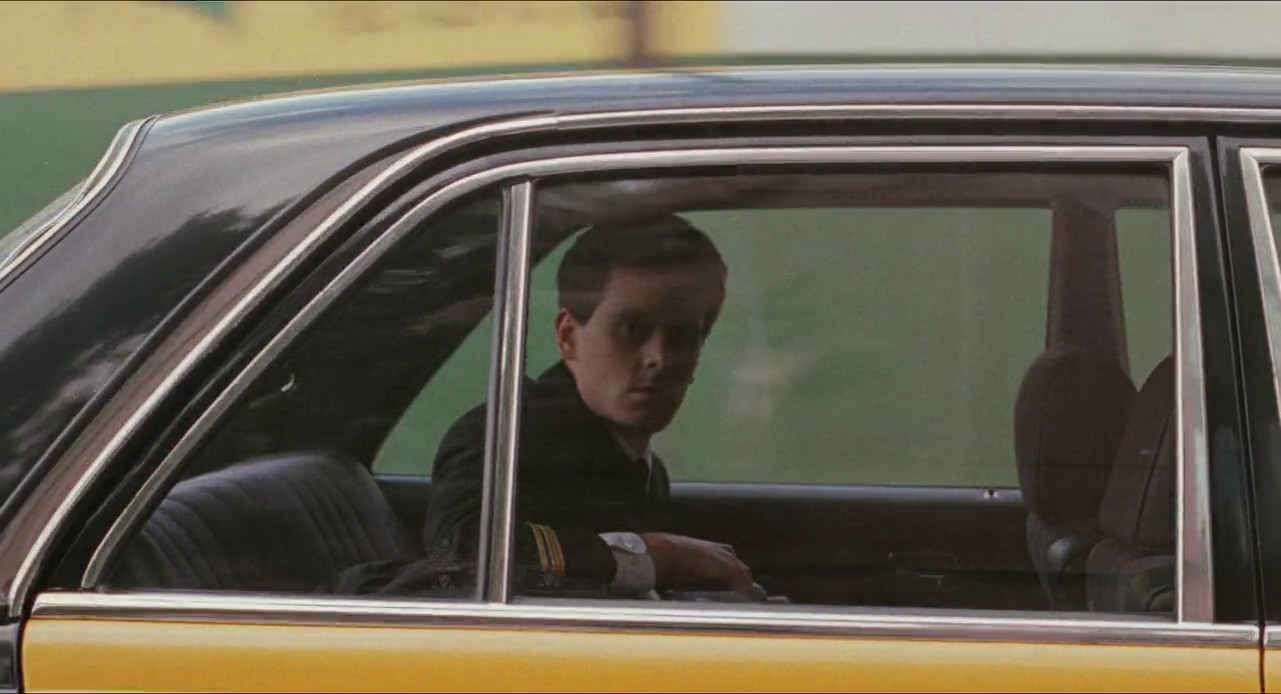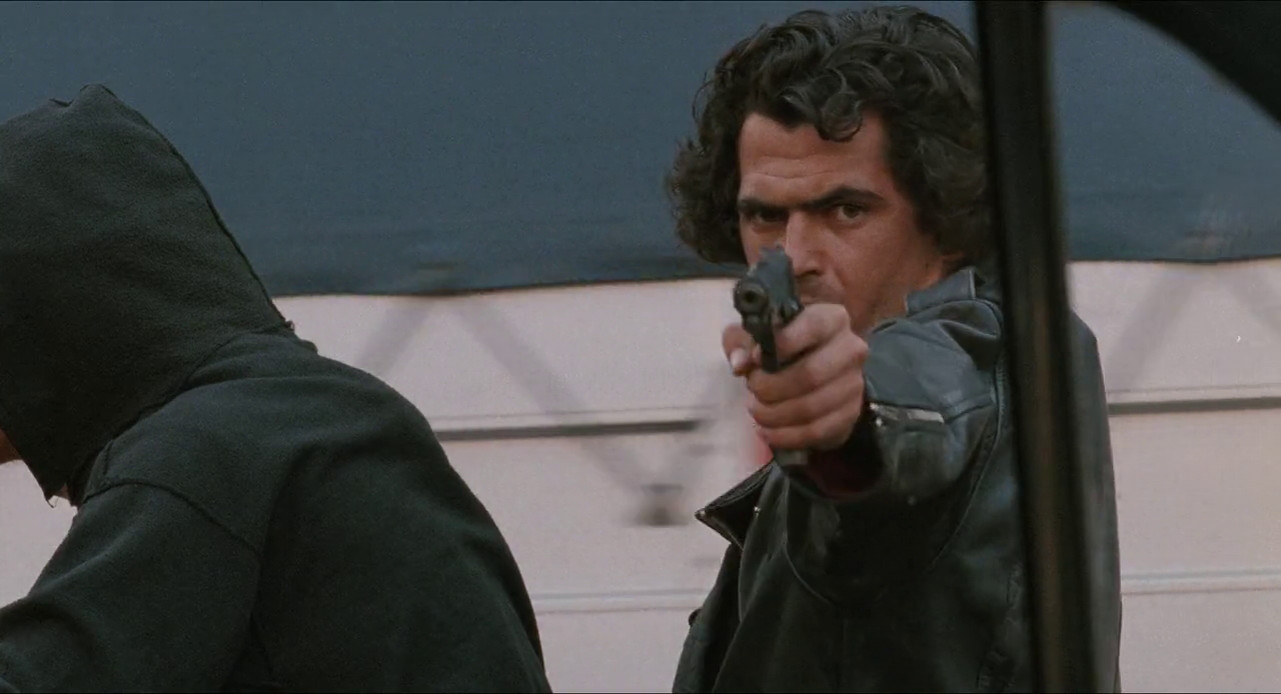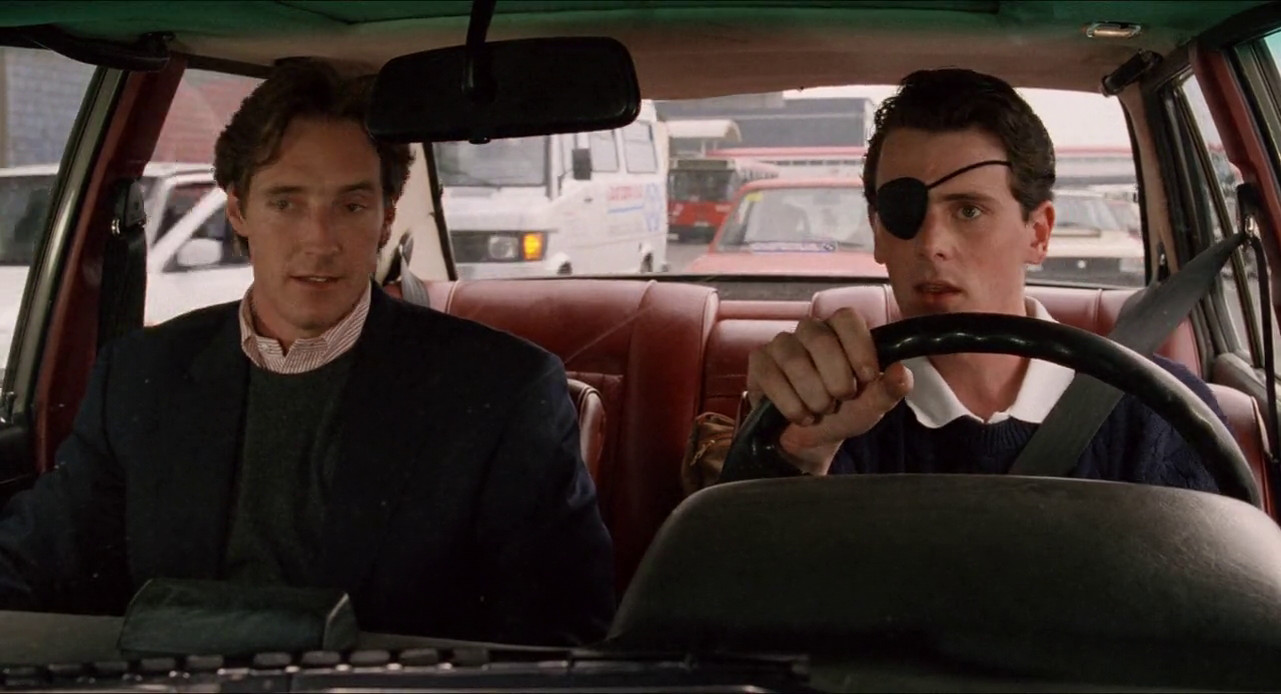If there’s one thing that marks somebody as nuts, it’s laughing loudly to nobody in public. If somebody is with somebody, they might gesture at such a person, and laugh quietly, perhaps making a “craaazy” gesture with their hand. Whenever I find myself laughing alone, it’s not, as in nature documentaries and with salad, a confirmation that some body is enjoying her body, but at memories of unbearable things people have said, which, now that I’m not in their presence, I find myself flying over, like the Midwest. But still, my own laughter feels unbearable; I’m longing for someone to make eye contact with, or now that the scene has passed, to have made eye contact. I feel that we would have been above the fray, as if we would not have then become the fray.

Films can make eye contact without requiring us to look away from the scene framed by the glance, but sharing a laugh is still tricky. Framing a scene as comedy is cheating, because nothing is between you if it was already there. The paraideal moment of bearing together is looking to the other and finding them laughing at almost the same thing. It can only be almost, and only almost ideal, and if it were exactly, that might be worse. In his three 90s films, Whit Stillman is trying to create in-jokes with camera and microphone, hoping we’ll almost laugh with him at the unbearable conversations of his remembered youth.
None of these are sitcoms exactly, but a historical situation in broad strokes deflates everything within. For Barcelona, it’s the opening intertitle that states the story takes place “in the last decade of the Cold War.” The male leads being soldiers in America’s dominophrenic ideological struggle abroad, it’s understood from the beginning that it’s still paranoia if they’re wrong. Ted and Fred, their names easily misheard for each other, especially if, for example, one’s first language isn’t English, are cousins with such a parodic childhood trauma dividing them that if this were sci-fi, I’d think it was an implanted memory. Instead, their unstable complimentarity keeps almost sounding like a metaphor for the relation of their adult roles of marketing and military, religious and patriotic, minds and hearts. In probably the most obvious joke shot of the film, we are shown that Ted hides The Holy Bible in the latest issue of The Economist. Fred meanwhile agrees that he really believes in “this shining city on a hill stuff,” while being the opposite of a volcel, which Ted seems to be becoming.
What Ted still holds against Fred is that Fred stole his kayak, and now Ted is always thinking that Fred is stealing from him. In my bad metaphor, it’s as if Ted is annoyed, in an Austrian School misapprehension, that Fred is impeding the free flow of capital with all the government spending he receives. This is the kind of meeting of eyes, fully believed in the moment, that if recalled alone, would be ruined.
It’s as if what Stillman took away from having really been an American verbally defending America in Barcelona is you can’t convince anyone, you can only make them laugh. As Chris Eigerman, who has starred in all of Stillman’s first three films, puts it, “you are allowed to laugh at these people, and when you laugh at these people, you actually start to sympathize with these people.” Stillman says he writes dialogue “from arguments that I’d lost,” but does he want to win? I feel like he’d rather poke out his eyes than expose his ass.

In the commentary track for The Last Days of Disco (a slightly more nostalgic film about a deflated historical moment), Stillman is at his most generous, praising the performances of Chloe Sevigny and Chris Eigerman, who are in the room with him, curious how the production went for them, and reminiscing about the real-life clubs the movie is based on. Sevigny doesn’t say much, but she does say “I don’t say much,” commenting on her character, Alice, in the film. Stillman explains that he intentionally wrote Alice as the everyperson, and that, moreover, he prefers to write women. He has also said that he “would like to write a movie about sociologically likeable characters.” Uncannily like the characterization under which her character struggles, when Sevigny speaks, it’s to make sharpish observations. Charlotte convinces Alice for a time that Alice is a joykill in a manner repellent to men, but she’s more of a Leia harmlessly ribbing Han. “You keep asking me about the fashion,” Sevigny says, laughing at Stillman when he asks her now likes what she’s wearing on screen for the third time. He becomes interested in her experience on set as an instance of what it’s like being a woman in a film, something else she seems irritably amused by. The whole conversation, she lurks like Sigmund Freud.
Without the palpable transferrance in the room, Stillman gets sour that the Barcelonian critics of Barcelona saw it as an inauthentic representation of their city (which is understandable, given its title). Bringing this up a decade after the fact is I guess an answer to my question: he wants to get in the last word after all. The argument about the film is a weird restaging of the film’s conflict between “American imperialists” (Stillman’s words) and Barcelonian intellectuals. Making the film was already a self-reproducing ritual: as Taylor Nichols, who plays Ted, says, it’s a script written by a guy who goes to Spain and falls in love with a girl, about a guy who goes to Spain and falls in love with a girl, the on-location production of which causes the lead actor to fall in love with a girl.
There’s a scene of dialogue that uses the language barrier to create a double entendre of looking and being looked at, between Ted and Monserrat, played by Tushka Bergen:
“You’re very perceptive.”
“What?”
“You’re very perceptive.”
“What?”
“You are very perceptive.” (He makes a gesture indicating a line from his eyes to her.)
“Thank you.” (From the way she says this, she has understood perceptive to mean good to perceive, pretty.)
“I don’t like perceptiveness of that kind.”
“It’s a typical pretty-girl thing, using observation for ridicule, as if impertinence were cute and charming. My impression of Aurora is that she’d be more apt to use observation for comprehension.”
“You don’t think Aurora’s pretty?”
“No.”
“But she’s beautiful.”
“Physically?”
“Yes, her eyes.”
“She’s beautiful because of her eyes?”
“Yes.”
In commentary, Eigerman is so overcome by the beauty of the nearly vaseline-lensed shots of Tushka Bergen and Mira Sorvino’s faces looking into the camera that he exclaims aloud, while Stillman remarks on how closely he wrote the script to his life: “Sometimes relationships are so much better when you can’t understand what the other person is saying, but try to preserve that for twenty years.” He recorded this in the same year that he separated from his wife, who I assume is the girl he fell in love with in Barcelona. He talks about intending his films to be less or more than understandable: “the film should be open to liking or disliking these characters.” We don’t say much.
Ted’s holy books, How to Win Friends and Influence People, Benjamin Franklin’s autobiography, and How I Raised Myself from Failure to Success, “really are good books,” Stillman comments. Of one of the first times in the film you get a sense of just what an ass Fred is, when he says that there’s no good way to say “American” in Spanish–the correct term, Estadounidense, “every time you hear it, estadouni-DENSE DENSE, it’s a direct slap in the face.”–Stillman remarks “this is true, there really is no right way to say it.” Ted sounds certain that he doesn’t want a woman to observe him for ridicule, but Whit doesn’t. The woman Stillman’s authorial voice aspires to be is, in Ted’s schema, neither pretty nor not pretty, neither ridiculing nor comprehending.
Ted’s farcial epiphany, “I’m beginning to reconsider my attitude toward female beauty; I think it’s very bad,” could thus be restated “I’m beginning to reconsider my attitude toward being ridiculed; I think it’s very bad.” But this is ridiculous from the start; Stillman is telling us “I would like to be ridiculed for once thinking that being ridiculed is bad,” by which he means to save himself from ridicule.
The movie ends with the most ambiguous scene with the most unambiguously ridiculous staging. Three American men are making hamburgers for three Barcelonian women, each man with a bottle of beer in their hand. The women go off to talk amongst themselves.
“What’s really terrific is that when we act in ways which might objectively seem assholish or incredibly annoying, they don’t get upset at all. They just assume it’s some national characteristic.”
“Cosa de gringos.”
“Yeah.”
“Fantastic.”
“Yeah.”
The flatness of this happy ending seems to feel that it isn’t fantastic. But, somehow, being understood is worse. Looking back on this story about meeting his wife, Stillman only laments that mutual incomprehensibility can’t be kept up. In film he’s found the technology to sustain incomprehensibility. It’s not through the surprises of a life that one evades the death of being understood, but through the control of theater that doesn’t rely on bodies to reproduce. The bodies on the receiving end of the fixed recording knowingly laugh alone even if together, and in understanding, don’t know anybody.
